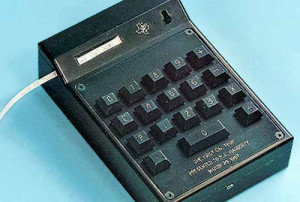“Miniaturized Electronic Circuits” Patent on February 6, 1959
Jack St. Clair Kilby
Kilby received his bachelor of science degree from the University of Illinois at Urbana-Champaign, where he was an honorary member of Acacia Fraternity. In 1947, he received a degree in Electrical Engineering. He obtained his master of science in Electrical Engineering from the University of Wisconsin-Extension in Milwaukee (which later became the University of Wisconsin–Milwaukee) in 1950, while simultaneously working at Centralab in Milwaukee.
In mid-1958, Kilby, as a newly employed engineer at Texas Instruments (TI), did not yet have the right to a summer vacation. He spent the summer working on the problem in circuit design that was commonly called the “tyranny of numbers” and finally came to the conclusion that manufacturing the circuit components en masse in a single piece of semiconductor material could provide a solution. On September 12 he presented his findings to management, which included Mark Shepherd. He showed them a piece of germanium with an oscilloscope attached, pressed a switch, and the oscilloscope showed a continuous sine wave, proving that his integrated circuit worked and thus that he had solved the problem. U.S. Patent 3,138,743 for “Miniaturized Electronic Circuits”, the first integrated circuit, was filed on February 6, 1959.[4] Along with Robert Noyce (who independently made a similar circuit a few months later), Kilby is generally credited as co-inventor of the integrated circuit.
Jack Kilby went on to pioneer military, industrial, and commercial applications of microchip technology. He headed teams that built both the first military system and the first computer incorporating integrated circuits. He later co-invented both the hand-held calculator and the thermal printer that was used in portable data terminals.
In 1970, he took a leave of absence from TI to work as an independent inventor. He explored, among other subjects, the use of silicon technology for generating electrical power from sunlight. From 1978 to 1984 he held the position of Distinguished Professor of Electrical Engineering at Texas A&M University.
He is also the inventor of the handheld calculator and the thermal printer, for which he has patents. He also has patents for seven other inventions.
In 1983, Kilby retired from Texas Instruments.


